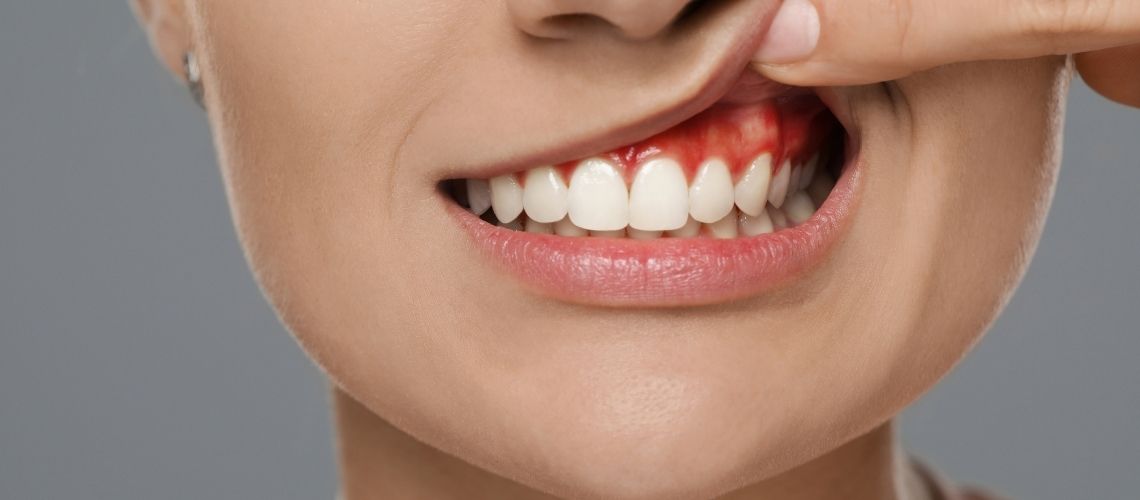Swollen gums are a common health problem among individuals. Although it is often associated with gingivitis, it can actually have many different causes. Hormonal changes, vitamin deficiencies, or serious infections can trigger these symptoms. Therefore, it is necessary to understand the underlying causes well to diagnose and create an effective treatment plan. Only then can the right treatment be applied, and gum health be maintained.
What Swollen Gums Mean
Swelling of the gums is usually an indicator of a health problem. This condition, which can be seen with the progression of gum diseases, can cause pain and discomfort. The underlying causes of swollen gums are varied and can sometimes be temporary or permanent. Firstly, infections can lead to this condition. Bacteria accumulating around the teeth cause inflammation in the gums. Additionally:
- Hormonal changes: Especially during pregnancy, women are more likely to experience gum problems.
- Vitamin deficiencies: Especially deficiencies in vitamins C and D adversely affect gum health.
Changes in the color of the gums and a tendency to bleed are prominent indicators of these problems. The gums may take on a reddish or purplish color and have a smooth, shiny surface. The treatment process begins with the correct diagnosis of the underlying cause and is usually carried out by relevant health professionals.
Causes of Swollen Gums
Gum swelling can stem from both dental health problems and general health issues. Several conditions lead to gum swelling, originating from dental sources. Foreign objects lodged in the gums, dental abscesses, and cavities are examples of these conditions. Additionally, gingivitis and periodontitis, which are gum diseases, also cause swelling. Especially poorly designed dentures and orthodontic treatments can cause discomfort in the gums.
- Foreign objects lodged in the gums
- Dental abscess
- Gingivitis
- Periodontitis
- Tartar
- Poorly designed dentures
- Orthodontic treatment
- Cavities
- Infected tooth
- Lack of oral hygiene
- Root fracture
- Unknown objects remaining under the gums
On the other hand, non-dental causes can also lead to gum swelling. The side effects of medications, viral infections like oral herpes or HIV, thrush, and other fungal infections are among health problems. Additionally, deficiencies in vitamins B and C, poor management of diabetes, and the use of tobacco products can contribute to these issues. Hormonal changes during puberty, pregnancy, and menopause can cause the gums to become more sensitive. Serious diseases like leukemia can also underlie gum problems.
- Medication side effects
- Viral infections (oral herpes, HIV)
- Fungal infections (thrush)
- Vitamin B deficiency
- Vitamin C deficiency or scurvy
- Poor management of diabetes
- Use of tobacco products
- Hormonal changes (puberty, pregnancy, menopause)
- Blood cancers like leukemia
Each of these reasons can affect gum health and cause swelling.
How Health Professionals Address Swollen Gum Problems
The treatment methods for individuals dealing with swollen gums vary depending on the underlying cause. If gum disease is detected, dentists recommend treatments appropriate for the severity of the disease. Various methods are available for treating swollen gums:
- The use of antibiotics is effective in controlling the infection.
- Improving daily oral care routines helps maintain gum health.
- Teeth should be brushed regularly.
- Dental floss should be used.
- Scaling and root planning are applied to clean plaque and tartar accumulated on the teeth.
- LANAP® promotes gum attachment and accelerates healing.
If the gum swelling is concentrated around only one tooth, this usually indicates a dental abscess. In this case, the dentist may perform root canal treatment or tooth extraction to treat the infected tooth. For those experiencing gum swelling unrelated to gum disease, health professionals conduct various tests to identify the source of the problem. If conditions like diabetes, infections, or vitamin deficiencies are detected, appropriate treatment methods are applied.
Home Remedies for Swollen Gums
Visiting a dentist is essential for gum swelling. However, some precautions can be taken at home during this period. Firstly, maintaining your daily oral care routine is very important.
- Brush your teeth regularly every day.
- Use dental floss to remove food particles stuck between your teeth.
Additionally, you can alleviate your symptoms with simple methods that can be applied at home.
- Rinse your mouth with warm salt water several times a day. This helps reduce inflammation.
- You can apply an ice pack to your face to relieve swelling and pain.
These methods help protect your gum health while reducing the severity of symptoms before consulting a specialist dentist. Keeping your oral hygiene at the highest level during this process is a critical step to prevent the problem from getting worse.
Will Gum Swelling Subside?
Gum swelling is usually a condition that can subside with appropriate interventions. If the swelling is caused by a food particle stuck in the gums, the problem can be resolved by removing this particle. However, if the condition is caused by a more serious issue like gum disease, the situation is different. Early intervention increases the success rate in treating gum disease and is crucial for long-term oral health. If gum disease is not treated, swelling and other symptoms can become permanent.
When to Seek Expert Help for Gum Swelling
Gum swelling can be an indicator of serious dental health problems. If the swelling lasts more than a few days, it is essential to visit a dentist, considering the severity of the situation. Dentists can identify the root cause of the problem and apply the correct treatment. Severe pain that does not subside with medication is also among the conditions requiring urgent intervention. Especially regarding gum health, acting quickly can prevent more significant health problems. Experts determine the treatment method based on the severity of the symptoms and can prevent the disease from progressing.
Causes of Gum Swelling Around My Tooth
Gum swelling is usually observed around the tooth and can be caused by various reasons. One of these swellings is the temporary inflammation caused by food particles lodged in the gums. This condition can usually be easily resolved with brushing and using dental floss. If the swelling persists, more serious health problems may be present.
Gum swelling sometimes indicates a dental abscess. A dental abscess can develop in two main types:
- Periapical abscess: This type of abscess forms when an infection in the pulp of the tooth spreads to the roots and surrounding bone. As the infection progresses, significant swelling can occur in the gums and sometimes the jaw.
- Periodontal abscess: This occurs with the accumulation of pus around the tooth and is usually the result of the progression of gum disease. A red and swollen appearance of the gums occurs.
If untreated, these abscesses carry the risk of spreading the infection to other teeth or even throughout the body. Infections reaching the bloodstream can pose life-threatening risks. Therefore, it is very important to take gum swelling seriously and intervene in time.
Is Gum Swelling Normal During Braces Use?
Wearing braces is an important step in the process of correcting teeth. However, this process can lead to swelling in the gums. Braces exert pressure on the teeth, which can cause the gums to become sensitive. Additionally, the presence of braces and brackets makes oral care more challenging. If regular and effective oral care is not performed, plaque accumulates around the brackets, leading to gum problems. Your dentist can recommend tools to help protect your gum health while using braces:
- Superfloss
- Oral irrigator
- Interproximal brushes
These tools make it easier to reach and clean the areas between the braces and brackets.
Frequently Asked Questions
What is good for gum inflammation at home?
There are several natural methods that can be used at home to alleviate gum inflammation. Rinsing with salt water helps reduce the infection. Baking soda used as toothpaste contributes to cleaning the gums and preventing bacterial buildup. Green tea, rich in antioxidants, can support gum health when consumed. While these methods provide temporary relief, the best approach for treating gum inflammation is to consult a dentist.
Is gum swelling dangerous?
Gum swelling is generally a condition that should be taken seriously. Especially if there are underlying causes like gum inflammation, this condition can progress to tooth loss or more serious infections affecting the jawbone. Early diagnosis and appropriate treatment are vital in preventing such complications. Therefore, if gum swelling is noticed, a dentist should be consulted without delay to prevent more serious health problems.
What reduces gum swelling?
There are several effective methods to reduce gum swelling. First, rinsing with warm salt water reduces inflammation in the gums and eases swelling. Additionally, applying a cold compress can relieve pain and swelling; in this method, an ice pack is wrapped in a thin cloth and held against the swollen area for 10-15 minutes. Regular and gentle brushing and flossing also help maintain gum health.
How long does it take for gum swelling to heal?
Gum swelling generally responds quickly to treatment if there is no systemic problem. After intervention by a dentist and using recommended mouth rinses, the swelling usually decreases or resolves completely within a week. However, each patient’s situation may vary, so it is important to follow the prescribed treatment closely.
Is salt water good for gum inflammation?
Yes, salt water can be beneficial for gum inflammation. Salt acts as a natural antiseptic and anti-inflammatory. These properties help inhibit the growth of bacteria and microbes in the mouth. Specifically, rinsing with salt water can neutralize harmful bacteria in the mouth and contribute positively to the healing process of gum inflammation. However, salt water should be used as a supportive method for oral hygiene, not as a standalone treatment method.
What vitamin deficiency causes gum swelling?
Gum swelling is often caused by a deficiency in vitamin C. This is commonly seen in scurvy patients and leads to inflammation of the gums. A deficiency in vitamin K can also negatively affect gum health. If left untreated, these vitamin deficiencies can lead to serious dental problems and tooth loss. Vitamin C, in particular, plays an important role in keeping gums healthy, and adequate intake supports gum health.
What causes gum swelling?
One of the main causes of gum swelling is poor oral hygiene. Insufficient oral care can lead to gum inflammation and periodontitis. Additionally, bacterial, viral, or fungal infections can cause gum swelling. Hormonal changes, particularly during pregnancy, puberty, or menopause, can also cause gum swelling. Certain medications, such as anticonvulsants, immunosuppressants, and some blood pressure medications, can also negatively affect gum health. Nutritional deficiencies, especially a lack of vitamins B and C, can deteriorate gum health. Finally, smoking and tobacco use can also lead to gum swelling.
How to treat gum inflammation at home?
There are several natural methods for treating gum inflammation at home. First, rinsing with salt water can help reduce inflammation. Additionally, diluted sage or sage oil can be used for its antibacterial properties, offering an effective solution. Aloe vera gel can be applied to the inflamed areas, left for a few minutes, and then rinsed off with water. Finally, a mixture of turmeric and water can be massaged onto the gums; this mixture also helps reduce inflammation. Although these methods provide temporary relief, it is always advisable to consult a dentist.
Why does wisdom tooth cause gum swelling?
Gum swelling around wisdom teeth is commonly observed as individuals enter adulthood. This swelling is often caused by the pressure of wisdom teeth trying to erupt through a limited space. Additionally, inflammation occurs when bacteria easily penetrate the area as the gum opens. Hormonal changes can also lead to gum swelling, particularly during menstruation, pregnancy, and menopause. Another common cause is gum inflammation due to neglected oral hygiene. Nutritional deficiencies, especially a lack of vitamin C, can also negatively affect gum health.

Dentist Handan Nohutcuoğlu graduated from Ege University Faculty of Dentistry in 1987. He has gained experience in various fields by working in many dental polyclinics throughout his career, combining his knowledge and experience. He continues to work at Hollywood Dental at the moment.









